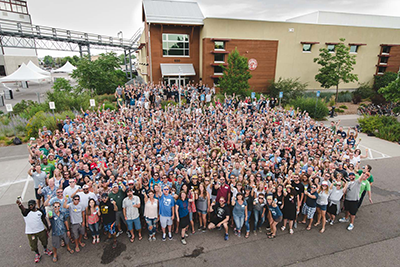
In ESOPs, capital remains the driving force with increased access to stock ownership for employees and growth in share value as the primary goal. The enterprise itself is a commodity with stock valued according to the market—what the business could be sold for at a given moment. In this context, the sale of New Belgium, or any ESOP, should not come as a surprise but rather the logical outcome of a model designed to distribute capital gains among workers. There is a built-in incentive for employee-investors to sell when share value is high or when access to financial capital is needed. Because votes are based on stock ownership, as in other investor owned firms, senior employee-investors with the most to gain from a sale have the most say in such a decision.
Cooperative firms, on the other hand, are designed for the ongoing use of the enterprise by worker-members (usus-fructus property rights), rather than their right to sell assets. Capital is treated as a means to an end rather than an end in itself, with surplus (or profit) returned to members on the basis of their labor. Asset locks, indivisible reserves and other mechanisms incentivize operation of the co-op as a multigenerational asset. Governed on the basis of one member, one vote, worker co-ops focus on employee empowerment, job retention and control over one’s work life.
We therefore need a new vocabulary, or maybe just a proper use of existing terms. While both co-ops and ESOPs are often included under the umbrella of “employee ownership,” this term has been largely appropriated by conventional economic thought that places the right to dispose of property at the center of ownership rights. This obscures alternatives such as cooperatives that are based on the right of members to use the enterprise for long-term employment, social purpose and economic development. Like other cooperatives, worker co-ops are “owned” by user-members—in this case, the people who actively work within the firm—but not in the conventional sense of the individual’s right to buy and sell property. Rather, collective ownership and decision-making by workers is more akin to citizenship in an economic democracy.
If employee-investors approve the transaction, the sale of New Belgium would be an indication that the investor interest of the current generation of employees overrode long-term employment and social concerns. In this context, the sale would be a success in that it represented an opportunity for substantial capital gains. If the goal of employee ownership is to root jobs and infrastructure in the community over time, the cooperative model may have been more appropriate.
—Erbin Crowell is Executive Director of the Neighboring Food Co-op Association and Chair of NCBA CLUSA’s Board of Directors. Sonja Novkovic is Professor at the International Centre for Co-operative Management at Saint Mary’s University and a member of NCBA CLUSA’s Council of Cooperative Economists. Crowell and Novkovic were invited by the Democracy Collaborative to submit this piece as part of a wider dialogue on the sale of New Belgium.


